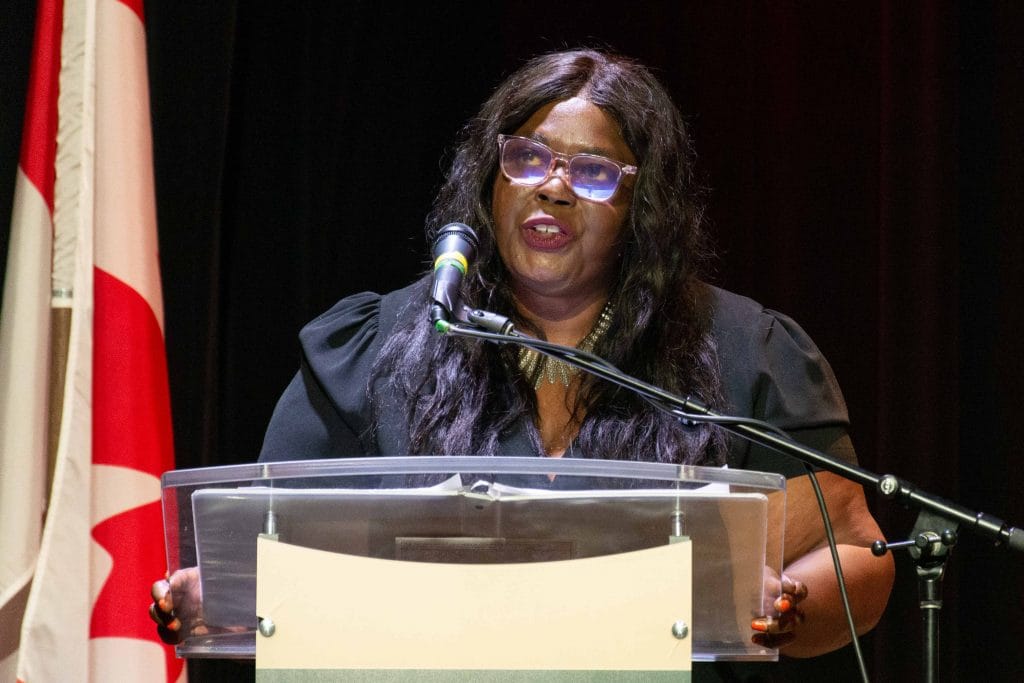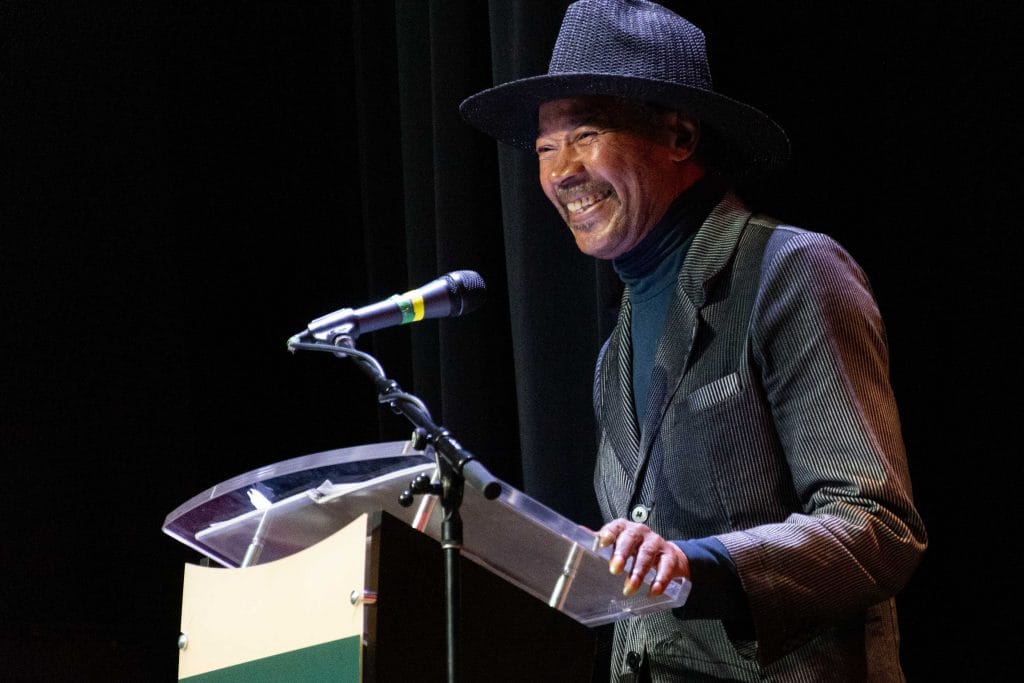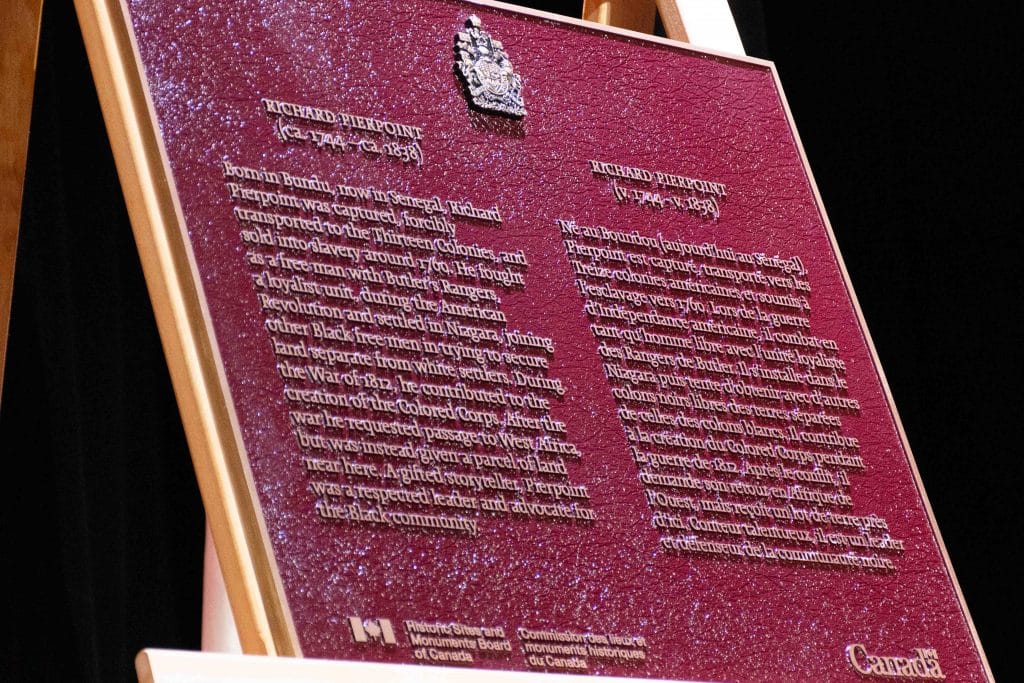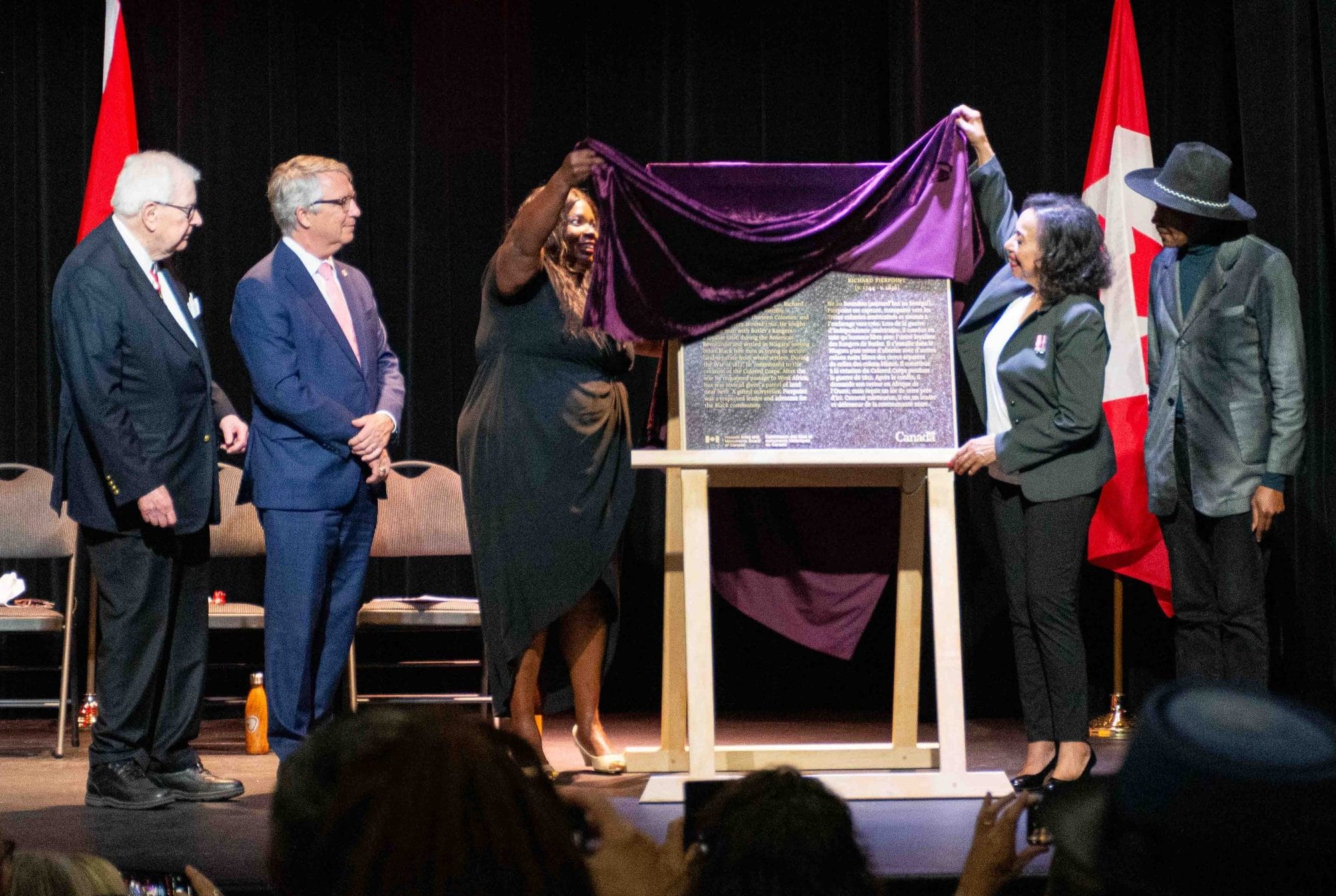FERGUS – The natural area bordered by the Grand River and located at the end of Anderson Street in Fergus, sought out by local dog walkers and daytripping flyfishers alike, will soon have a new monument installed honouring the life of the area’s past owner.
The acreage of trodded pathways surrounded by field grass, passing over a winding creek and beyond a stand of trees, known by locals as Pierpoint Park, once belonged to African-Canadian Richard Pierpoint, believed to be one of the area’s first Black settlers.
“I am extremely pleased that one of Canada’s great community leaders and builders, Richard Pierpoint, is finally getting the honour he truly deserves with this commemorative plaque,” said Millicent Gordon.
The Centre Wellington Black Committee president spoke from the stage of the Fergus Grand Theatre, addressing a room of residents, local politicians and Parks Canada staff during a ceremony on Oct. 1.

Students from John Black Public School sing the national anthem at the Fergus Grand Theatre on Oct. 1. Photo by Jordan Snobelen
Parks Canada designated Pierpoint as a national historic person in 2020, and with the recognition comes the commemorative plaque.
Centre Wellington staff worked with the Historic Sites and Monument Board of Canada, under the authority of Parks Canada, recommending the plaque be placed at the Pierpoint Fly Fishing Nature Reserve, also known as Pierpoint Park. Council approved the location on Sept. 11.
A weathered, dilapidated township plaque detailing Pierpoint’s life is currently the only sign of his life there.
“It is by the accounts of his life that Richard Pierpoint became a hero to me,” Gordon told the audience on Sunday.
“What stands out most for me in his life story is not necessarily his war service, nor is vigorous fight for his freedom, but instead his love for community,” she said.
“He was a true and committed leader.”

Centre Wellington Black Committee president Millicent Gordon speaks at the Fergus Grand Theatre on Oct. 1. Photo by Jordan Snobelen
In 1760, at just 16 years old, Pierpoint was abducted from what is now Senegal, in West Africa, and sold as a slave to a British officer who named him Richard Pierpoint, taking on the officer’s surname.
He was a slave for 20 years when news of freedom in exchange for military service reached Pierpoint.
Rosemary Sadlier, who was instrumental in establishing Black History Month in Canada, told the audience on Sunday that freedom could be had for fighting during the American Revolution.
“He quickly joined, becoming a member of Butler’s Rangers by 1780,” Sadlier said, delivering a narrative of Pierpoint’s life before he arrived in Fergus.
After returning to what became Upper Canada in 1791, following a British loss, Pierpoint found himself a free man for the first time in his existence.
He worked as a labourer until the War of 1812 presented what Sadlier called a “tangible threat of re-enslavement.”
Pierpoint, along with other African Canadians, was thrust into action to protect his freedom, Sadlier said.

Rosemary Sadlier, past president of the Ontario Black History Society, speaks at the Fergus Grand Theatre on Oct. 1. Photo by Jordan Snobelen
He petitioned the government to create an all-Black unit called the Coloured Corps of Upper Canada, but ended up serving in a unit led by a white officer and called Captain Runchey’s Company of Coloured Men.
At the age of 68, Pierpoint again stepped to the frontlines to defend against Americans in battles across the Niagara Peninsula.
Finally, in 1822, at the age of 78, Pierpoint petitioned Lieutenant Governor Peregrine Maitland to return him to his African homeland.
“He wanted to go home, he longed for Africa, he had given his heart to freedom; but his soul longed for a re-connection to home,” Sadlier said.
“Because you stole my life, took me from my wife, cause my family strife, stuck in my heart a knife, you cast my people into slavery, you stole the wealth of my country, and now you give me the repudiation for my overdue repatriation,” poet Clifton Joseph called out in a dramatization of Pierpoint’s plea.

Dub poet Clifton Joseph speaks at the Fergus Grand Theatre on Oct. 1. Photo by Jordan Snobelen
“Now, I want to go home to rest,” Joseph said in quieted tones. “Let me die in Africa.”
Peirpoint was denied, and instead granted 100 acres of land in modern-day Fergus (then Garafraxa) in a veteran’s land grant.
Pierpoint Park accounts for a 10-acre portion of that total acreage today.
“It’s crucial that Pierpoint’s story is remembered,” Guelph Liberal MP Lloyd Longfield said.
“It’s through designations like these that we can cast a light on the diversity of our nation’s history.”

Guelph MP Lloyd Longfield speaks at the Fergus Grand Theatre on Oct. 1. Photo by Jordan Snobelen
Gordon called the day an “important and proud” one for the county and the nation.
On the count of three, a royal-purple velvet drape was pulled from the plaque, revealing Pierpoint’s story in raised gold lettering on a stone-like maroon background.
Sadlier remarked, “It’s a way of remembering, a way of creating space in our hearts and minds for the thing we all long for: an understanding of who we are and the place that is home.”

A plaque honouring Richard Pierpoint was revealed at the Fergus Grand Theatre on Oct. 1. The plaque will be installed at Pierpoint Park in Fergus. Photo by Jordan Snobelen




